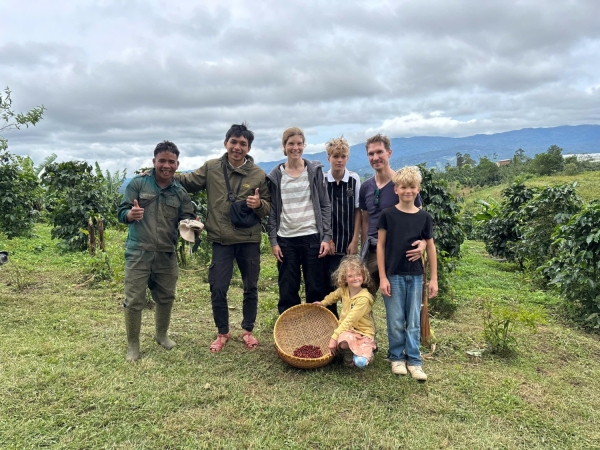
Bài tiếng Việt đã được dịch (Vietnamese Version) tại đây: La.Kao & HuyEco – Trà Rừng, Văn Hóa Bản Địa & Hành Trình Bền Vững | HuyEco.vn
This morning, I guided two guests on a half-day HuyEco tour through our Arabica coffee garden and Oolong tea facility. At the factory, we explored the post-harvest processing of Oolong tea—from withering to rolling, oxidizing, and drying. The air was filled with a warm, floral aroma, and the guests were instantly captivated.
Captured at Oolong tea factory – this ‘shaking’ step activates natural fermentation by gently tossing the leaves, enhancing the tea’s signature floral fragrance. It’s one of the essential stages in post-harvest tea processing, often featured in our half-day tours.
As the conversation deepened, they began asking about authentic Vietnamese tea flavors, especially wild teas grown in remote forests without chemical input—teas connected to sustainability and indigenous cultures.
Their questions reminded me of a special visit I made a few months ago to La.Kao Teahouse in Hội An—a quiet space that offered not just exquisite tea, but insight into natural farming, preservation, and the soulful side of tea in Vietnam. That experience stayed with me, and I’d like to share it here.

La.Kao doesn’t stand out at first glance. There are no flashing signs or crowds lining up outside. It sits quietly on a small alley just off Phan Châu Trinh street. A half-open wooden door, a few lush pots of greenery at the entrance. Inside, the noise of the old town fades, replaced by soft light, gentle music, and a calm welcome from the owner.
📍 La.Kao Teahouse
34, Alley 71 Phan Châu Trinh, Hội An, Vietnam
Open daily from 12:00 to 7:00 PM
www.lakao.vn
The owner—a calm, introspective man with deep knowledge of tea—sat with me and shared stories behind each tea on the menu. What struck me wasn’t just the flavor (though every tea was exquisite), but the origin and purpose behind each leaf.
He spoke of his treks into remote northern forests of Vietnam, where wild, ancient tea trees still grow. Instead of mass harvesting, he chooses to pick modestly, buy directly from local ethnic communities, and never use chemical intervention.
“Tea is more than a drink. It's a way to keep the forests, the people, and the culture alive,” he said.


I chose a tasting set featuring three varieties: a high-elevation Oolong, a wild-grown Shan Tuyết green tea, and a chilled salted apricot tea called Hoi An Summer—La.Kao’s house specialty. Each tea was steeped three times. Every pour offered a different character. The owner patiently guided me through the nuances of each one: where it was grown, how it was processed, and what made it unique.
I sat there for nearly an hour—no phone, no distractions. Just tea, conversation, and a quiet appreciation for being right there, in that moment.

As someone who works in sustainable coffee farming, I realized that tea and coffee may differ in flavor, but they share a common soul. Both can serve as bridges between people and nature, when grown and shared with care.
La.Kao isn’t just a teahouse. It’s a micro-ecosystem where tea is respected like a living being, and guests are invited into a quiet story of protection and purpose.

I left La.Kao as the sky began to dim. My heart felt light, as if rinsed clean by the aroma of tea and the honesty of that space.
If you ever find yourself in Hội An, and you’re someone who values not just what’s in your cup, but the path it took to get there—I believe you’ll find something memorable at La.Kao.
“Tea doesn’t have to be fancy. Just honest.”
— A line from that quiet afternoon I’ll never forget.

Half-Day Coffee & Tea Tour at HuyEco
👉 https://huyeco.vn/en/page/eco-coffee-tour.html
→ Learn about HuyEco’s immersive half-day tour, including Arabica coffee farming and Oolong tea processing.
Blog: A Sustainable Farm-to-Cup Experience in Da Lat
👉 https://huyeco.vn/en/blog/sefwe-48.html
→ A detailed look at the full HuyEco tour experience, from coffee cultivation to tea tasting.
HuyEco Homepage
👉 https://huyeco.vn/
→ Explore HuyEco’s mission, products, and sustainable farming practices.
Agroecological Tea Practices in Vietnam – Springer Journal
👉 https://link.springer.com/article/10.1007/s42398-021-00182-w
→ A scientific review of sustainable tea farming methods and challenges in Vietnam.
Vietnamese Tea Culture & Heritage – VietFAS
👉 https://vietfas.vn/en/tra-viet-nam-tinh-hoa-van-hoa-huong-vi-dat-troi/
→ An overview of Vietnam’s tea history, cultural significance, and economic role.
Solutions for Vietnamese Tea Sustainability – VBCSD
👉 https://vbcsd.vn/en/detail.asp?id=575
→ Insights from a national conference on improving tea quality and sustainable development.
Reader Comments
Newer articles
 Sustainable Coffee & Local Culture Tour in Da Lat — Arabica, Robusta & Ethical Farming
Sustainable Coffee & Local Culture Tour in Da Lat — Arabica, Robusta & Ethical Farming
 Discover Sustainable Coffee in Da Lat — A Farm-to-Cup Journey with HuyEco
Discover Sustainable Coffee in Da Lat — A Farm-to-Cup Journey with HuyEco
 Sustainable Coffee and Local Farming Realities in Da Lat HuyEc
Sustainable Coffee and Local Farming Realities in Da Lat HuyEc
 From Forest to Cup: A Personal Journey into Sustainable Coffee in Da Lat
From Forest to Cup: A Personal Journey into Sustainable Coffee in Da Lat
 Inside HuyEco: How a Coffee Huller Machine Transformed Our Coffee Production
Inside HuyEco: How a Coffee Huller Machine Transformed Our Coffee Production
 From Forest to Cup: A Farmer’s Vision for Sustainable Coffee and Local Travel in Da Lat
From Forest to Cup: A Farmer’s Vision for Sustainable Coffee and Local Travel in Da Lat
 Field Notes from Xã Lát: Rooted in Regenerative Coffee & Indigenous Farming
Field Notes from Xã Lát: Rooted in Regenerative Coffee & Indigenous Farming
 Đưng K'Nớ: Brewing Sustainable Coffee in Vietnam’s Highland Forest
Đưng K'Nớ: Brewing Sustainable Coffee in Vietnam’s Highland Forest
 Living Coffee Ecosystem in Da Lat – HuyEco’s Way of Growing
Living Coffee Ecosystem in Da Lat – HuyEco’s Way of Growing
 Nel Drip & Wabi-Sabi: Japanese Coffee Rituals at HuyEco Da Lat
Nel Drip & Wabi-Sabi: Japanese Coffee Rituals at HuyEco Da Lat